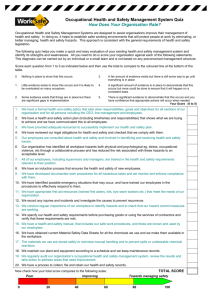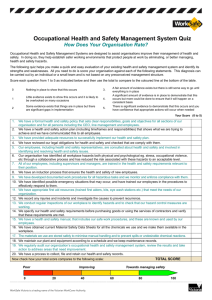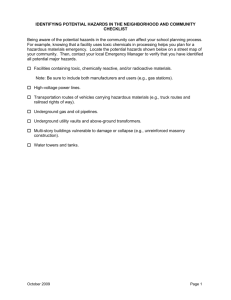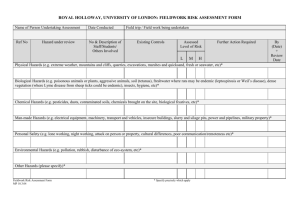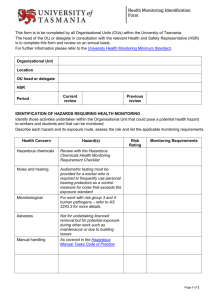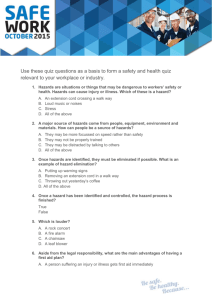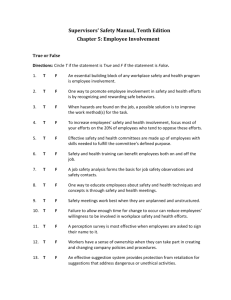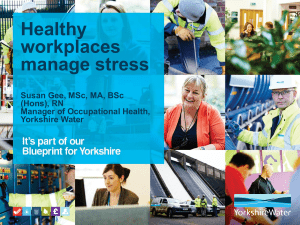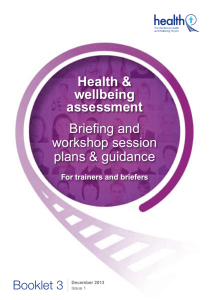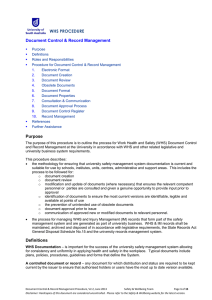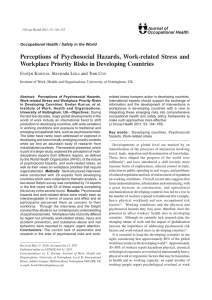Is the risk management model and hierarchy of control relevant for
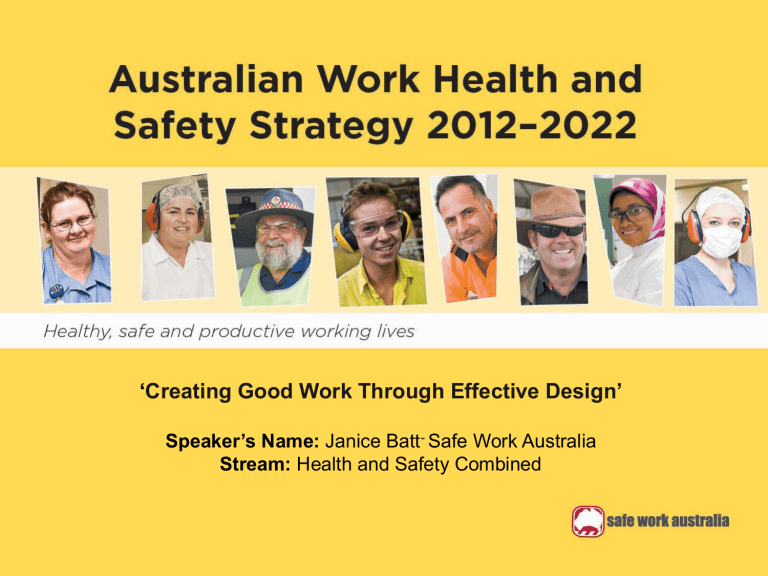
‘ Creating Good Work Through Effective Design’
Speaker’s Name: Janice Batt Safe Work Australia
Stream: Health and Safety Combined
Safe Work Australia
2
Impetus for change
• Changing work environment
• Legal requirements
• Global , regional, local and organisational drivers for change
– downsizing, restructuring, new
ITC systems, retooling, refurbishing……
• Community expectations
Australian WHS Strategy 2012-2022
To drive key national activities to improve work health and safety
Action Areas
Design & management of work, work processes and systems of work to eliminate or minimise hazards and risks
Work Design
Design of structures, plant and substances to eliminate or minimise hazards and risks before they are introduced into the workplace
Who really designs work?
Those who decide
• what is done and why, where, when and how work is done
• organisational goals, building location and design, workstations, structure and staffing, shifts, ITC systems etc.
• what workplace goods and services are purchased
6
Good work is….
work is “the content and organizing of tasks, activities, relationships, and responsibilities within a job or role” Parker,
2014 healthy and safe work where the hazards and risks created by the work are eliminated
(or minimised so far as is reasonably practicable) and where the work design optimises human performance, job satisfaction and productivity.
7
Types of work design
↘ An intervention for an individual
↘ “Job crafting”
↘ RTW programme
↘ Reasonable adjustment versus
↘An organisational intervention
↘improving business outcomes
↘creating a healthier safer workplace
↘design or redesign of work/tasks for a group
↘part of restructuring / some other change
↘to go beyond compliance….
Good work design considers..
good work ‘effective’ design
Physical emotional mental capacities and needs
How the work is performed
Plant equipment materials and substances work environment
Work –
Systems and processes
The Workers
‘Characteristics of Work’
“Work (Job) Characteristics”
Working with chemicals = possible exposure to toxic chemicals
Physical
Characteristics
Biomechanical
Characteristics
Repetitive tasks lifting heavy loads = risks of back strain
Supervisor micromanages tasks = lack autonomy
Psychosocial
Characteristics
Cognitive
Characteristics
Excess vigilance tasks = cognitive overload
Good Work Design
Ten principles that help to achieve good work design
• Evidence-based
• Easy to understand
• Interconnected with each other
• Limited in number
Developed with Work Health and
Safety Queensland and Comcare
Based on extensive consultation www.safeworkaustralia.gov.au
Principles of Good Work Design
How : process of designing good work
What : defining elements of good work design
Why : evidence-based reasons for work design
Why use the principles?
•
•
•
•
•
•
Healthier and safer workplaces
Improved worker wellbeing and productivity
Improved useability of products
More efficient and effective work and work processes
Organisations and business are operating within regulatory requirements
Reduced workers’ compensation claims and costs from deaths, injuries and illnesses
13
‘Why’ Principles
Principle 1: Good work design gives the highest level of protection against harm so far as is reasonably practicable
It’s the law!!
Legislative framework
WHS laws (WHS Act and regulations)
Codes of practice
Guidance
Prevention of Psychological Injuries Fact sheet
meets community expectations
‘Why’ Principles cont..
Principle 2: Good work design enhances health and wellbeing
Prevents ill health promotes wellbeing
Improves health and safety over short & longer Health is “a complete term including: state of physical, mental and social well-being, and not
• physical and mental health merely the absence of disease or infirmity.”
• good health, use of skills & creativity
………… job satisfaction & general wellbeing
15
‘Why’ Principles cont..
Principle 3: Good work design enhances business success and productivity
Better design:
• optimises performance saves…..
– faster responses to problems
– higher creativity and innovation
– more efficient and effective procedures
• reduced errors
• lower supervision costs
[Parker, 2014, Tregaskis et al 2013]
16
‘What’ Principles
What needs to be done ?
Principle 4 : Good work design addresses physical, biomechanical, cognitive and psychosocial characteristics of work, together with the needs and capabilities of the people involved.
17
The ‘What’ Principles cont..
Principle 5: Good Work Design considers the business needs, context and work environment
• What needs to be done
?
– the business needs - is ‘fit for purpose
– specific context
– work environment: structures and plant, work layout, technology, ICT systems, organisational design and culture, HR systems, work health and safety processes….
18
‘
What’ Principles cont..
Principle 6: Good work design is applied along the supply chain and across the operational lifecycle .
Good work design
• applied along the supply chain
– design, manufacture, distribution, use and disposal of goods
&
• considers issues across operational lifecycle
– start-up, routine operations, maintenance, downsizing and cessation
19
‘
How’ Principles
Principle 7: Engage decision makers and leaders
Work is designed well by:
• engaged decision makers and leaders
• decision makers provide adequate practical support and resources
–
Does the design ROI include costs and benefits?
– Is the design process adequately resourced and the timeline realistic ?
20
‘How’ Principles cont..
Principle 8: Actively involve the people who do the work, including those in the supply chain and networks
Work is designed well by:
• involving people who do the work
• PCBUs must consult with workers and others
• don’t forget the invisible workers and users
Are all the users consulted before the design is signed off?
21
‘How’ Principles cont..
Principle 9: Identify hazards, assess and control risks, and seek continuous improvement
Good work design includes:
• Identify, assess and control hazards and risks
– use a systematic risk management approach
• Continuous improvement
– good work as part of business processes -not a one-off event
– long term sustainability requires designs be continually monitored and adjusted
– build in feedback loops and new information to improve designs
Is this good work practice embedded in your workplace?
• applies to Psychosocial hazards
Safe Work Australia, Model Code of Practice – How to Manage Work Health and Safety Risks
22
The ‘How’ Principles cont..
Principle 10: Learn from experts, evidence, and experience
Evidence
Experts
Experience
Successful Work Design
Summary & Thank you!
1. The why principles
– are outcome based and explain why good work design is important
2. The what principles – what needs to be considered during the design process
3. The how principles – how you go about implementing the principles
• Handbook published on SWA website
• We are collecting case studies and resources to illustrate use of the principles
• Promote, disseminate and evaluate
24

